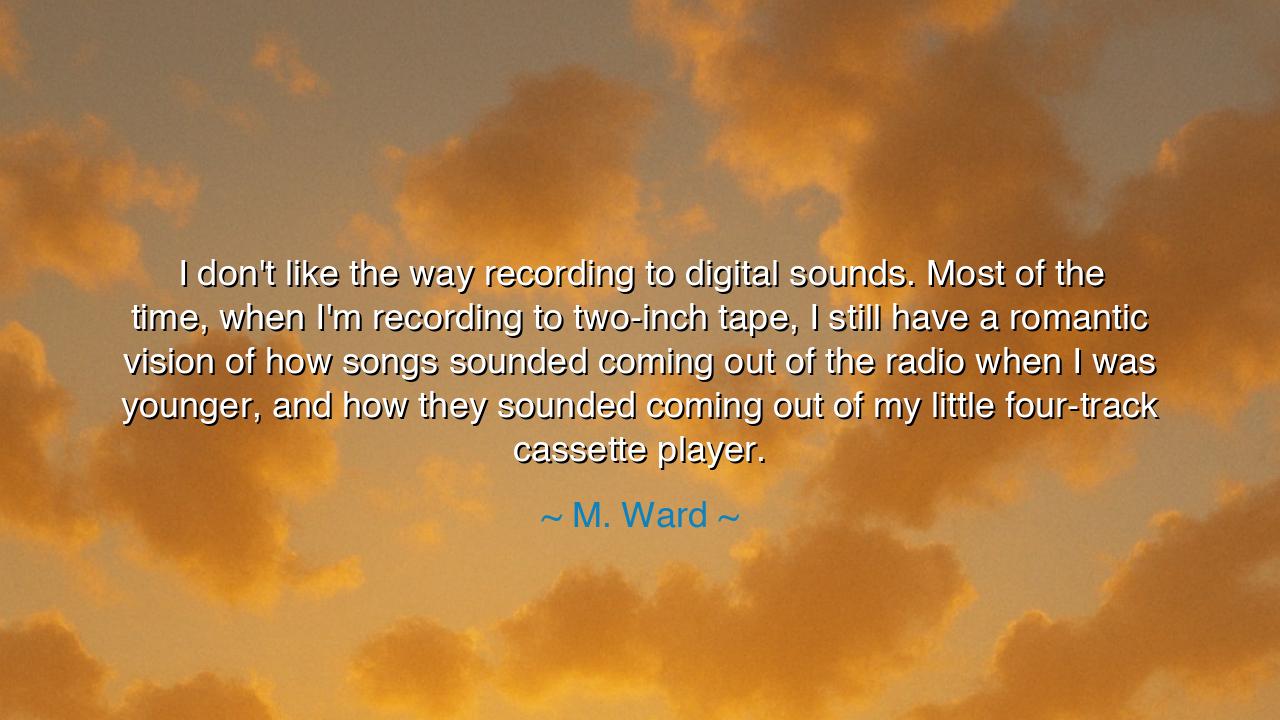
I don't like the way recording to digital sounds. Most of the
I don't like the way recording to digital sounds. Most of the time, when I'm recording to two-inch tape, I still have a romantic vision of how songs sounded coming out of the radio when I was younger, and how they sounded coming out of my little four-track cassette player.






The words of M. Ward—“I don’t like the way recording to digital sounds. Most of the time, when I’m recording to two-inch tape, I still have a romantic vision of how songs sounded coming out of the radio when I was younger, and how they sounded coming out of my little four-track cassette player.”—carry the weight of memory, of longing, and of reverence for a vanished era. He speaks here not merely of sound, but of the way sound becomes a vessel for experience, for the soul of a generation, for the intimacy of discovery. His reflection is not only technical; it is poetic, reaching into the heart’s connection with music as it once lived.
In this confession, Ward draws a contrast between digital recording and the warmth of analog tape. Digital may be sharper, clearer, more efficient—but to him, it lacks the human imperfection that makes sound breathe. In the hiss of tape, in the soft compression of magnetic reels, there is a kind of romance, a warmth that reminds him of the first times he fell in love with music. His longing is not for technology alone, but for the vision of youth, when music pouring from a humble radio or cassette player carried with it the fragrance of possibility, wonder, and the awakening of the soul.
This is a truth older than the modern age. Every generation mourns the loss of some medium that carried its dreams. The Greeks once lamented the move from oral poetry to the written word, fearing that the memory of the bard’s living voice would fade into cold symbols. Centuries later, when the printing press was born, some mourned the loss of illuminated manuscripts, whose artistry could not be replicated by type. And so it is with Ward: his lament is not against progress itself, but against the fading of the warmth and humanity that earlier forms carried within them.
Consider the story of John Lennon, who often spoke of the early days of rock ’n’ roll, when songs by Chuck Berry or Little Richard crackled through tiny radios. Those sounds, primitive by later standards, carried an energy that transformed culture. It was not the clarity of the recording, but the passion it conveyed, that mattered most. Lennon, like Ward, carried with him the romantic vision of how music first struck him—not pristine, not perfect, but alive. It is this aliveness Ward seeks in his devotion to tape, to the humble cassette, to the dream of music as it once entered his life.
The meaning of Ward’s words, then, is not nostalgia alone, but a teaching about the essence of art. True art is not about technical flawlessness but about feeling. The grain in the voice, the hiss of the tape, the distortion of the radio—these imperfections are not defects but evidence of humanity. They remind us that art is not machine-born, but human-born, shaped by memory, longing, and imperfection. To have a romantic vision is to insist that what matters most is not sterile perfection but emotional truth.
The lesson is clear: do not let the pursuit of clarity rob life of its warmth. In music, in love, in work, and in relationships, it is not perfection that matters but presence, sincerity, and the texture of experience. Digital sound may be flawless, but it does not always move the heart. So too in life—efficiency and polish are not enough if they lack soul. Embrace the hiss, the crackle, the imperfection, for within them lives authenticity.
Practically, this calls us to remember our own first visions—the songs, the sights, the moments that awakened our wonder. Let us not abandon them in the rush toward progress. Let us cherish the forms that carry humanity within them, even as we embrace the new. For in doing so, we carry the warmth of the past into the future, ensuring that the human heart remains at the center of all creation.
Thus, the words of M. Ward echo across generations as both lament and wisdom. Technology may change, but the soul of art remains eternal. The task of the artist, and of every human soul, is to preserve that warmth, that romance, that vision—so that the songs of our lives are not only heard, but felt.






AAdministratorAdministrator
Welcome, honored guests. Please leave a comment, we will respond soon